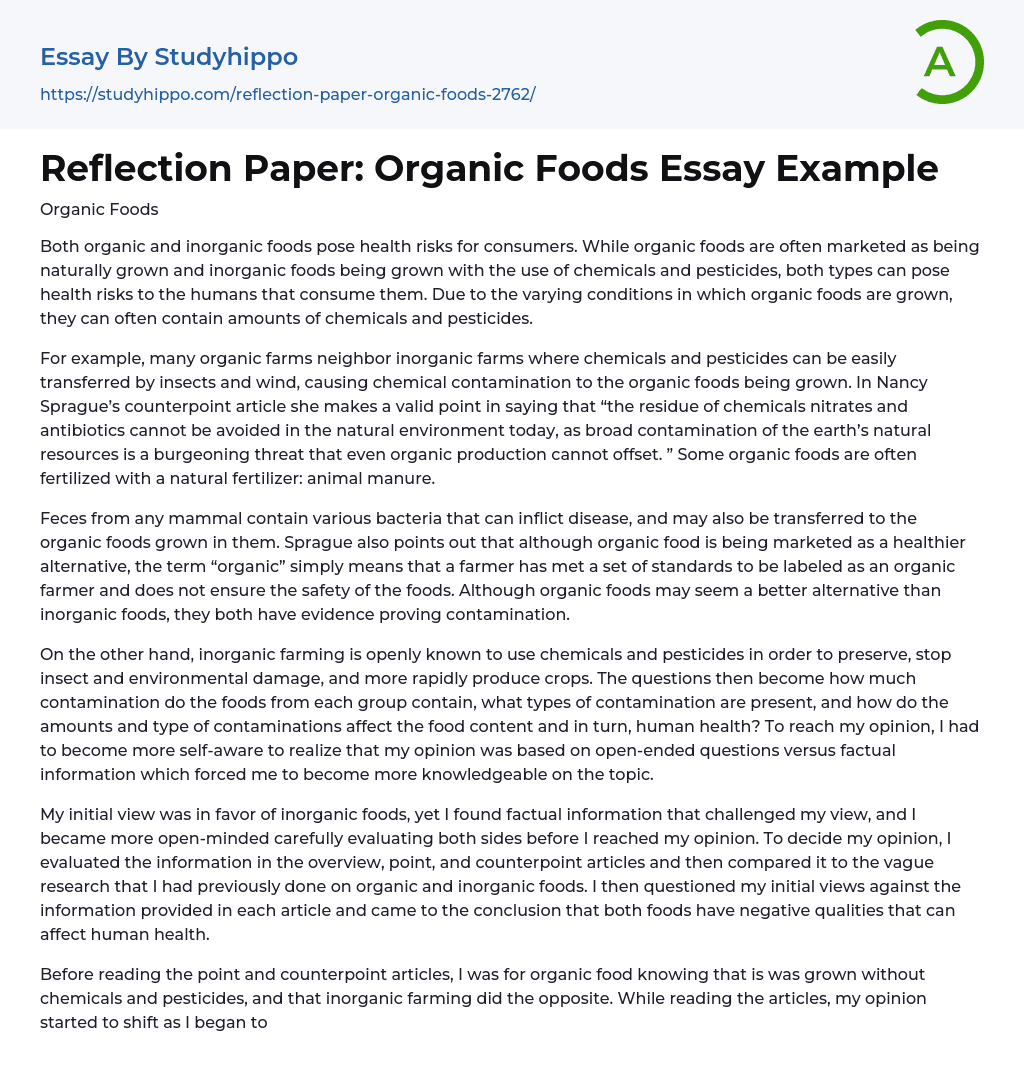Organic Foods
Both organic and inorganic foods pose health risks for consumers. While organic foods are often marketed as being naturally grown and inorganic foods being grown with the use of chemicals and pesticides, both types can pose health risks to the humans that consume them. Due to the varying conditions in which organic foods are grown, they can often contain amounts of chemicals and pesticides.
For example, many organic farms neighbor inorganic farms where chemicals and pesticides can be easily transferred by insects and wind, causing chemical contamination to the organic foods being grown. In Nancy Sprague’s counterpoint article she makes a valid point in saying that “the residue of chemicals nitrates and antibiotics cannot be avoided in the natural environment today, as broad contamination of the earth’s natural resources is a burgeoning threat that
...even organic production cannot offset. ” Some organic foods are often fertilized with a natural fertilizer: animal manure.
Feces from any mammal contain various bacteria that can inflict disease, and may also be transferred to the organic foods grown in them. Sprague also points out that although organic food is being marketed as a healthier alternative, the term “organic” simply means that a farmer has met a set of standards to be labeled as an organic farmer and does not ensure the safety of the foods. Although organic foods may seem a better alternative than inorganic foods, they both have evidence proving contamination.
On the other hand, inorganic farming is openly known to use chemicals and pesticides in order to preserve, stop insect and environmental damage, and more rapidly produce crops. The questions then become how much contamination do the foods from eac
group contain, what types of contamination are present, and how do the amounts and type of contaminations affect the food content and in turn, human health? To reach my opinion, I had to become more self-aware to realize that my opinion was based on open-ended questions versus factual information which forced me to become more knowledgeable on the topic.
My initial view was in favor of inorganic foods, yet I found factual information that challenged my view, and I became more open-minded carefully evaluating both sides before I reached my opinion. To decide my opinion, I evaluated the information in the overview, point, and counterpoint articles and then compared it to the vague research that I had previously done on organic and inorganic foods. I then questioned my initial views against the information provided in each article and came to the conclusion that both foods have negative qualities that can affect human health.
Before reading the point and counterpoint articles, I was for organic food knowing that is was grown without chemicals and pesticides, and that inorganic farming did the opposite. While reading the articles, my opinion started to shift as I began to understand some of the marketing strategies that make organic foods seem healthier than they may actually be. It was difficult to read the counterpoint on organic foods due to my loyalty to the brand, however, there were some truths that I had to recognize which made me rethink my initial position before reading the articles.
Looking at both sides of the issue challenged my way of thinking by forcing me outside of my comfort zone which allowed me to step out of choosing one
side or the other, but instead recognizing both the good and bad attributes of both organic and inorganic foods have. I did change my ethical stance realizing that organic foods are not necessarily healthier as they are also contaminated, leading me to a greater understanding than what I originally had. Information on precisely how and how much they are contaminated was not found.
From the authoritative evidence found in Berger’s article, he explained how manure was used to fertilize organically grown crops and that it is considered a “natural resource”. In today’s society, it is important to make sound ethical decisions as to the decisions we make do not only affect us, but also those around us. It is particularly important to be ethical when making decisions about food, as they directly affect a persons’ health, and if the wrong decision is made, it could cost someone’s life.
References
- Sprague, N. (2009).
- Counterpoint: Organic food is unnecessary & the current food supply is safe.
- Point of View,
- Retrieved August 20, 2011, from the Point of View
- Reference Center database. Griswold, A. (2009).
- Organic food: an overview. Point of View,
- Retrieved August 21, 2011, from the Point of View
- Reference Center database. Berger, A. (2009).
- Point: Organic foods are a healthier alternative.
- Point of View,
- Retrieved August 20, 2011, from the Point of View
- Reference Center database.
- Agriculture essays
- Albert einstein essays
- Animals essays
- Archaeology essays
- Bear essays
- Biology essays
- Birds essays
- Butterfly essays
- Cat essays
- Charles Darwin essays
- Chemistry essays
- Dinosaur essays
- Discovery essays
- Dolphin essays
- Elephant essays
- Eli Whitney essays
- Environmental Science essays
- Evolution essays
- Fish essays
- Genetics essays
- Horse essays
- Human Evolution essays
- Isaac Newton essays
- Journal essays
- Linguistics essays
- Lion essays
- Logic essays
- Mars essays
- Methodology essays
- Mineralogy essays
- Monkey essays
- Moon essays
- Mythology essays
- Noam Chomsky essays
- Physics essays
- Plate Tectonics essays
- Progress essays
- Reaction Rate essays
- Roman Numerals essays
- Scientific essays
- Scientific Method essays
- Scientist essays
- Seismology essays
- Space Exploration essays
- Stars essays
- Sun essays
- Thomas Edison essays
- Tiger essays
- Time Travel essays
- Universe essays




